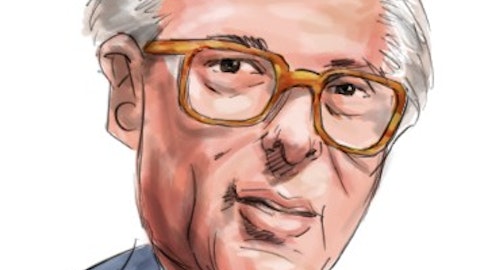Michael Diana: Yeah. Okay. Great. All right. That’s it for me. Thank you very much.
Louis Hoch: Thank you.
Operator: [Operator Instructions]. The next question comes from Gary Prestopino with Barrington Research.
Gary Prestopino: Hey, good afternoon, everyone. A couple of questions. First of all, Greg, you said the payback growth was up 27%. Is that processing volume or revenues?
Greg Carter: Revenue.
Gary Prestopino: Okay. So I guess, and I’ve always asked this question, but your card revenues were only up 4.8% in the quarter. Yet PayFac was — generated — there is a really big delta there. What percentage of the card revenues are generated by PayFac? Because it’s got to be that that legacy portfolio keeps trading. And that’s what keeps us from really showing pretty strong revenue growth in your segment.
Greg Carter: No. You’re — that’s exactly correct. We added an additional $45 million in processing volume through the first nine months of net new processing volume on the PayFac platform and the legacy singular portfolio is trading faster than it has historically. So we’re making up for that. It’s kind of — we’ve got to sell or we’ve got to process twice as much just to show that growth curve. But the —
Gary Prestopino: How much of the portfolio singular is left, then?
Greg Carter: There’s a meaningful amount. We have two legacy portfolios, one from PDFs and singular that’s — about if you add those two up, it’s about 60% of our card business. But the increase that we saw, the $1.1 million increase over the first nine months is 100% PayFac.
Gary Prestopino: Okay. So this is still going to be something that is going to continue to impact the growth in card for quite some time?
Greg Carter: At the macro level, that’s correct. I mean, card in general, we’re not selling into those portfolios any longer. We’re doing our best to manage the attrition. So obviously, the sales efforts are on new ISVs exclusively.
Gary Prestopino: Have you given any efforts? You just thinking about selling those portfolios and then you just have a pure PayFac comparison there?
Louis Hoch: No, we don’t want to sell the portfolios. The majority of those portfolio customers are integrated with us, which makes it a hard portfolio to sell. And that portfolios still generating quite a bit of revenue for us.
Gary Prestopino: Okay. And then– I was writing down which you’re saying, did I hear you right that we can see a step down in gross margin in Q4 or decline in gross profit in Q4? I couldn’t quite get that because you were talking about that prepaid spoilage — is coming down.
Louis Hoch: It’s definitely going to depend on what the mix is from product lines. But we will know that we’re going to be paying New York the majority of the spoilage in fourth quarter and first quarter and second quarter of next year. So we’re anticipating that the quarter should look very similar to this quarter.
Gary Prestopino: Okay. So similar quarter, and a step down in SG&A, right?
Louis Hoch: Yes. We will have as many one-time things as we have this quarter.
Gary Prestopino: Okay. And then on with these with this state program that you signed up, is that a guaranteed income program or is that an unemployment program or what exactly is that, Houston? Can you please elaborate?
Houston Frost: The State of California [indiscernible] disaster relief, it’s funded partly from federal funds from the USDA with the State of California administering it. And they told us that there’s $95 million that will go out with cards. We’ve only loaded about $35 million today. So that program will continue for — until the money’s all exhausted and I know in the state of California, they’ll probably add more money to it to serve.
Gary Prestopino: So that would deal with things like fires, earthquakes that they have out there? That money would be released at that position?
Louis Hoch: [Technical Difficulty] from the floods that occurred? It was already — the disaster has already occurred. When people ask us, why further does that imply it was signed as a whole.
Gary Prestopino: So many disasters out there. Okay. So this dealt with the floods last year, right?
Houston Frost: Yeah. Because we’ve we won this business because of our success with LA County.
Gary Prestopino: Okay, great. Thank you.
Operator: The next question comes from Steve Riney with Integrity Wealth Advisors.
Steve Riney: Hey guys. Great work in the quarter and the year so far. Just a quick follow-up on the last gentleman’s question about the next quarter at Louis. I think you said that it’s going to be very similar to this one with the exception that those one-time charges might be in there. So is that am I understanding that correct?
Louis Hoch: Yes. And interest income will be up dramatically. Okay.
Steve Riney: So on an adjusted EBITDA basis, we’ll have a profit because of this, we only had $100,000 adjusted EBITDA loss in the quarter. And so if the expenses are down and the interest is up, that should be a really good look for us as am I reading that correctly?
Louis Hoch: I’m not going to provide guidance there, but I can tell you where you’re going.
Steve Riney: It’s just simple math, I guess. So I just wanted to make sure I heard it right. The other thing is congratulations on the state, whether it’s one-time or not, it’s a good new market. You mentioned it was a new market. Can you talk about any other new markets that you’re getting in and you’re looking at getting in any expansion of what you’re going to be able to do, especially after the investment into the capacity?

